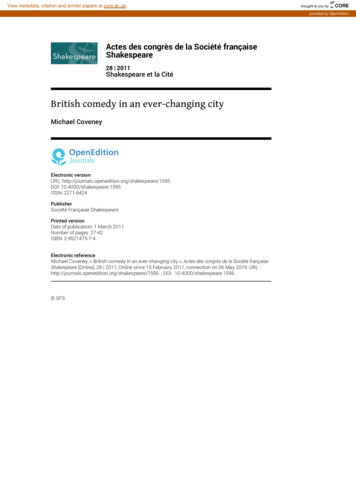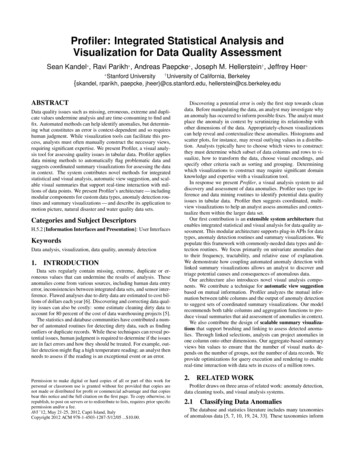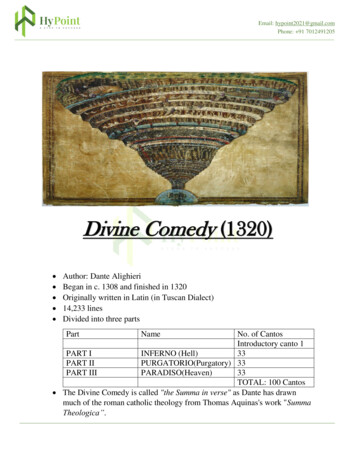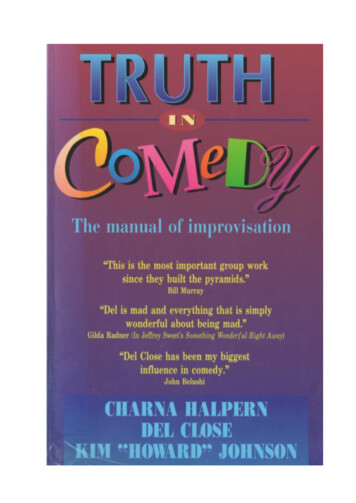
Transcription
View metadata, citation and similar papers at core.ac.ukbrought to you byCOREprovided by OpenEditionActes des congrès de la Société françaiseShakespeare28 2011Shakespeare et la CitéBritish comedy in an ever-changing cityMichael CoveneyElectronic versionURL: I: 10.4000/shakespeare.1595ISSN: 2271-6424PublisherSociété Française ShakespearePrinted versionDate of publication: 1 March 2011Number of pages: 27-42ISBN: 2-9521475-7-4Electronic referenceMichael Coveney, « British comedy in an ever-changing city », Actes des congrès de la Société françaiseShakespeare [Online], 28 2011, Online since 15 February 2011, connection on 06 May 2019. URL :http://journals.openedition.org/shakespeare/1595 ; DOI : 10.4000/shakespeare.1595 SFS
Shakespeare et la Citéactes du Congrèsorganisé par laS OC IÉ TÉ F RA NÇ A I SE S H A K E S P E A R Eles 11, 12 et 13 mars 10textes réunis parPierre KAPITANIAKsous la direction deDominique GOY-BLANQUET
COUVERTURE :Edouard Lekston 2010conception graphique et logoPierre Kapitaniak 2011 Société Française ShakespeareInstitut du Monde AnglophoneUniversité de Paris III – Sorbonne Nouvelle5 rue de l’École de Médecine75006 Pariswww.societefrancaiseshakespeare.orgTous droits de traduction, de reproduction et d’adaptationréservés pour tous les pays
BRITISH COMEDY IN AN EVER-CHANGING CITYMichael COVENEYL’idée de la cite, et de la citoyenneté, dans Shakespeare et plus abstraite et plus poétique que dans lesgrandes « city comedies » de Ben Jonson et de Thomas Middleton. Mais la grandeur de Shakespeare permet àdes pièces comme Measure for Measure et Timon of Athens d’être refaçonnées comme de véritables « citytragedies ». Et cette vitalité et cette satire des meilleures comédies jacobéennes continuent à être trèsprésentes dans le théâtre britannique contemporain.The idea of the city, and citizenship, in Shakespeare is more abstract, and more poetic, than in the great citycomedies of Ben Jonson and Middleton. But the greatness of Shakespeare allows for plays like Measure forMeasure and Timon of Athens to be re-minted as genuine city tragedies. And there is a great and abiding strainin contemporary British drama of the vitality and satire in the best Jacobean comedy.Ihave often wondered what Shakespeare’s audiences at JuliusCaesar must have felt about ancient Rome and the history of thefirst people to invade our island. Were their rulers like our rulers,their people like our people, their city like our city?The most recent Royal Shakespeare Company production of theplay begins with an interpolation, a bear-pit fight between two nearnaked sub-humans, Romulus and Remus, the victor claiming the spoilsand founding the city that is then represented as a seething mob on avideo film, a virtual crowd.1This mob appears on screens as the crowd at the funeral orationand the soldiers at Philippi. Amazingly, to me at least, this filmicproletariat even takes a curtain call, bowing and waving to the realaudience as if they could see us through the membrane of the celluloid.This was doubly hilarious as the actor playing Julius Caesar hadalready contributed a first night howler that is instantly memorialisedin Stratford folklore: as he proudly proclaimed that he was “constant asthe northern star,”2 he tripped on his toga and fell on his fanny.I am not trying to suggest that Julius Caesar is a city comedy,though of course funny things always happen in performance. Whenthe Globe did the play some years ago, the authenticity of the funeralscene was so great, and the audience involvement so real, that one ofthe extras shouting out for the will to be read was asked to shut up and1 Julius Caesar, directed by Lucy Bailey at Stratford-upon-Avon, 2009.2 Julius Caesar, III.i.65 (All Shakespeare quotations from The Complete Works ed.Jonathan Bate and Eric Rasmussen, RSC/Macmillan 2007).
28MICHAEL COVENEYmove on by one of the officious ushers who roam the pit and make surethat no-one is standing or sitting in the wrong place.3 The poor actorprotested that he was in the play – it was a modern dress production –but the usher was unimpressed and insisted that he cleared thegangway and moved along.It may be worth noting, too, that when John Gielgud playedCaesar at the National Theatre in London in 1977 he was rathercrestfallen to learn that the crowd would only consist of two dozenactors, recalling that there used to be hundreds, in the heyday of thelate Victorian and Edwardian theatre. Today they’re on film.We still relate in Britain to the Romans much more than to theirsuccessive invaders and occupiers: in our roads, the vestigial remainsof city walls in our Roman towns such as York, Colchester orChichester, or just plain Chester, and in our language and our legalsystem.And the idea of “civitas” – of civility and of being a citizen –derived from the Latin, as well as the idea behind the word, informs somuch of Shakespeare’s comedy and, I believe, the root and branch ofour contemporary theatre in Britain, too.In Much Ado About Nothing Beatrice can joke that Claudio is as“civil as an orange” (II.i.203), referring to the bitterness of the Sevilleorange while Claudio stands quietly by, but civil, or civic, behaviour –whether it be Othello’s doing the State some service, or in thesubversive paradigms of civil and authoritarian hierarchy in TheTempest or Measure for Measure – is the yardstick, the standard, theideal, of how Shakespeare saw the way we should live.As a country boy, Shakespeare’s way of writing about the city isoften one of visiting it with excitement, rather than anatomising itsdaily routines as writers like Ben Jonson and Thomas Middleton do,carrying their characters through the streets, shops and taverns.When Falstaff brings Justice Shallow and the others fromGloucestershire for his triumphant entree to the court of the new KingHal, the scene is preceded by two grooms crying for “More rushes,more rushes, the trumpets have sounded; it will be two of the clock erethey come from the coronation” (2 Henry IV, V.v.1).And soon, of course, the Lord Chief Justice is dispatching SirJohn to the Fleet prison; the golden age of carefree carousing in the3 Julius Caesar, directed by Mark Rylance, Shakespeare’s Globe, 1999.
BRITISH COMEDY IN AN EVER-CHANGING CITY29Eastcheap tavern is already a thing of the past and the thin-bloodedPrince John sounds the note of civic propriety in the last words of theplay, both harsh and curiously beautiful:I will lay odds that, ere this year expireWe bear our civil swords and native fireAs far as France. I heard a bird so singWhose music, to my thinking, pleased the king.Come, will you hence?(V.v.91-95).It is as though the reality of what has happened on the citystreets has already expired in the smug smog of the royal purpose.Shakespeare often uses the idea of city life in a deliberately vague andunlikely way. For instance, in Twelfth Night, when Sebastian falls inlove unexpectedly with the suddenly rapacious Olivia, he assumes anidentity he simply doesn’t have when he’s a tourist, saying things like,“Shall we go see the relics of this town?” (III.iii.20) – what town? This isIllyria, lady – or “I pray you let us satisfy our eyes with the memorialsand things of fame that do renown this city” (III.iii.23-25) – and, again,what city exactly, is that?I would like to discuss two contemporary British plays in thiscontext of citizenship in a minute, but first we should highlight thestark differences between a play like Shakespeare’s Henry IV (bothparts) and Ben Jonson’s Everyman in His Humour. Both were firstperformed in 1598, the year before the Globe and James Shapiro’sexcellent book, and Shakespeare probably played Old Knowell, asuspicious father who pursues his son across London in the course ofone day, from dawn to dusk.The father and son relationship in both plays is the crux of thematter, but while Shakespeare sets his to the outlines of historicalchronicle, and weighs the higher matters of how one should best live asa citizen and, indeed, as a king, Jonson first sets his play, as directed byconvention, in Florence. By the time he writes a prologue to the 1616Folio edition, however, he is adamant that the characters are to beEnglish, and the setting, London.In moving the play to London for his first real success –coincidentally written in the same year as he killed an actor in a dueland was imprisoned – Jonson was deliberately aligning the piece withthe city comedies of John Marston, Thomas Middleton and others
30MICHAEL COVENEYwhere the metropolis itself becomes almost a character in the day-today affairs of the urban middle-class, and where the plot – one ofdizzying and brilliant complexity in this play no less than in hismasterpiece in the genre, Bartholomew Fair – is a vehicle for a criticaldisplay of modern moods and manners.So, Old Knowell sets out from pastoral Hoxton in the north,crossing Moorfields to the City stews and the Windmill Tavern,following his son, Young Knowell who is a decent lad in love withBridget, the sister of a hypochondriac, Kitely, who is consumed withjealousy. This Kitely, a close cousin of Shakespeare’s Ford in TheMerry Wives, which had also opened this season in the Shoreditchtheatre, is convinced that his wife is whoring (she isn’t) at the waterbearer’s lodging – where, too, the ludicrous martial figure of CaptainBobadill (close cousin, again, of Pistol in the Henry plays) rules theroost.Although the play was popular in David Garrick’s day, andCharles Dickens acted the role of the bombastic Bobadill in an 1845amateur production, there is record of only three revivals since: one in1937, one by Joan Littlewood and her Theatre Workshop in 1960 andthe one I’d been waiting for in the RSC’s newly opened Swan Theatre inStratford-upon-Avon in 1986. It’s not just the intrigues, the deceptions,the gulling, the arguments about tobacco, the roistering, that make theplay so enjoyable; it’s the picture of a city on the move, on the makeand on the money.Shakespeare’s Henry IV plays, and Jonson’s first Everymanplay, appear in the same year, too, as John Stow’s important Survey ofLondon in which the historian reckoned that London was beingsteadily wrecked by the population, which had grown by 120 per centin the 16th century –despite the plague – from 75,000 people to200,000. Stow lamented the chronic overbuilding which stemmedfrom the greed of developers and speculators, and he saw swindlerseverywhere “that more regarded their own private gain, than thecommon good of the City.”4How familiar does that sound? Today, in London, we have twonew plays, both playing in the West End, that are derived directly fromthe sort of civic disillusion and unrest we sometimes find inShakespeare’s histories (notably perhaps the Jack Cade scenes in4 John Stow, A Survey of London (London: John Wolfe, 1598), p. 127.
BRITISH COMEDY IN AN EVER-CHANGING CITY31Henry VI), but it’s easier to see a precedent for the modern citycomedies of the British stage in those of Jonson, Marston andMiddleton.There is in contemporary British drama an ineluctable strain ofcivic satire and political purpose that is far more Jonsonian thanShakespearean. But Shakespeare is always unavoidably implicated,because of his greatness in transforming the urgent civic issues, say, ofTroilus and Cressida or Measure for Measure or The Merchant ofVenice, into great poetry and philosophical argument. And this straincomes from the Jacobeans right through the Restoration comedies ofCongreve and Wycherley to Goldsmith and Sheridan in the 18th centuryand finally (admittedly after a big hiatus) Shaw and Granville Barker atthe start of the 20th.Theatre in London is conscious of the broad lines of thisdevelopment and has always viewed Shakespeare backwards throughnot only these precursors but also Brecht and Joan Littlewood, whowas our equivalent, but much rougher, of Ariane Mnouchkine. Thisleads, also, to the main justification for Peter Hall founding the RoyalShakespeare Company in 1960, in order to place our national poet inthe context of a contemporary theatre. Hall always said that you shouldthink of a classic as a modern play and a modern play as a classic. Andthis in turn explains why the two new plays to which I have alreadyreferred – Enron by Lucy Prebble5 and Jerusalem by Jez Butterworth6– have made such a big impact, quite apart from their inherent anddistinctive qualities.Both plays were presented at the Royal Court Theatre, spiritualand practical home of Shaw and Granville Barker and later of JohnOsborne and Arnold Wesker, and both do, I believe, remind modernaudiences of where our theatre comes from. In Enron, Lucy Prebble, avery young writer, has written a thrilling analysis of the collapse ofAmerica’s seventh largest corporation in 2001; the success of the playhas proved, for the moment at least, that there is no business like bigbusiness in show business.Of course the meltdown in American capitalism is indivisiblefrom that in our own, but the metaphorical power of the play, which iscertainly Jacobean, catches the crazy energy and tunnel vision of what5 Lucy Prebble, Enron (Methuen Drama, 2009).6 Jez Butterworth, Jerusalem (Nick Hern Books, 2009).
32MICHAEL COVENEYwas going on in our own City institutions, and in the character ofJeffrey Skilling, the former chief executive of Enron now serving a longprison sentence, a tragic anti-hero, we have a Macbeth of marketmanipulation who literally creates capitalist castles in the air byinventing a truly Jonsonian scheme of criminal fantasy: he bringsCalifornia to its knees with power cuts in order to sell on electricity atmassively inflated prices. This really did happen.Enron is also an echo of a scintillating verse play called SeriousMoney, written by Caryl Churchill7 in 1987, “hot off the presses” on theinternational trading floors, an exciting response to the Big Bang,concupiscence and pillage among the corporate raiders, take-over bidsand make-believe world of futures and options. Churchill prefaced herplay by quoting a scene of Thomas Shadwell’s 1692 comedy TheVolunteers: or The Stockjobbers and in this extract there is apremonitory flash of a nation on the rampage for shares in publicenterprises and the leisure markets – not in hotels or fashion, but inperforming monkeys and rope acts.Poor old Shadwell is best remembered as John Dryden’spilloried tautologist in Mac Flecknoe: “The rest to some faint meaningmake pretense; but Shadwell never deviates into sense.”8 But hisexample was a direct inspiration to Churchill, whose every singlecharacter was marked by greed and corruption, from the chairman ofAlbion Products to the corporate raider, the Ghanaian importer andthe Peruvian investor who sheds her holdings in the mines when theprice of copper plummets, abandoning the work force to their fate.There’s an unexplained suicide and a landslide election victory for theConservative Party – “five more glorious years”9 – as the loads-amoney bandwagon rolls inexorably onwards.Serious Money, like two earlier epic city comedy collaborationsbetween David Hare and Howard Brenton – Brassneck (1973)10 abouta family and its fortunes in a Britain of shady deals and drug empireconnections; and Pravda (1985)11 monitoring the arrival in a listlessnewspaper industry of a grotesque villainous mogul and media7 Caryl Churchill, Serious Money (Methuen, 1987).8 John Dryden, Mac Flecknoe, in Selected Poems (Penguin Classics, 2001), p. 99.9 Slogan of the Conservative Party’s election campaign in 1984.10 Howard Brenton and David Hare, Brassneck (Methuen, 1974).11 Howard Brenton and David Hare, Pravda (Methuen, 1986).
BRITISH COMEDY IN AN EVER-CHANGING CITY33magnate not at all dissimilar to an amalgamation of Rupert Murdochand the late Robert Maxwell – operated in a mood of helpless buttheatrically vibrant opposition.Enron, on the other hand, now represents a majority feelingabout what has gone on, a general outrage that has led to correctivepolitical action, just as the Bernie Madoff12 trial in America also offeredanother summary of what went wrong. But of course as we know fromhistory, and the Jacobeans, nothing ever really changes and we needthese plays to keep us alert and our communal sense of civil and moraljustice intact.Butterworth’s Jerusalem also has a Shakespearean character atits centre in the figure of Johnny Rooster, a Falstaffian party-giver anddrug dealer who lives in a mobile home in the heart of a West Countryforest on the edge of the urban encroachment, that is, a council estate,that mock memory of a vivid and meaningful street life in the city. It isthe day of the local fair and the day of Johnny’s eviction. It is also StGeorge’s Day (nobody mentions Shakespeare’s birthday) and that localfair is in full swing, though it’s not what it used to be.The play contains a poetic farewell to the buried life of the oldstone circles, the legends and mythologies of Arthurian Albion, theforce of the ley lines, and also operates as their last resurrection. ButJohnny, whose very existence is led in defiance of the civic authorities,will no more conquer than will Falstaff, and his fate is just as cruel. Hegives some advice to his six-year-old son, who has visited the forestencampment with his mother: “School is a lie. Prison’s a waste of time.Girls are wondrous. Grab your fill Don’t listen to no-one and nothingbut what your own heart bids. Lie. Cheat. Steal. Fight to the death.Show me your teeth.”13This flagrant outsiderism embodied in Johnny Rooster as muchas in any Lord of Misrule, works like a safety valve for our frustratedtransgressive instincts, just as it does in Jacobean city comedy. You canonly behave badly in the country if you’re upsetting the people comingfrom the town, but urban hooliganism, if properly expressed, can bejust as invigorating. One of the best examples is the outlandish12 Bernard Madoff, New York stockbroker convicted in 2009 of defrauding thousands ofinvestors of billions of dollars and sentenced to a maximum prison term of 150 years.13 Jerusalem, Act 3.
34MICHAEL COVENEYcollaboration between Jonson, John Marston and George Chapman onEastward Ho! in 1604 (the same year as Measure for Measure).The play is best remembered perhaps for the fact that Jonsonand Chapman were thrown briefly into prison (Marston escaped) forcommenting adversely on the purchase of knighthoods, authorized byKing James, and also for some poor taste Scottish jokes. But thecombination of a goldsmith’s apprenticeship, the hilariousdetermination of a city daughter to become a lady, with disastrousresults, an expedition to Virginia that stalls laughably on the Isle ofDogs, and a persistent undertow of licentiousness, make it irresistibleto read and indeed to watch in the theatre, as the RSC proved only afew years ago.The critical reputation of Thomas Middleton owes a great dealto T. S. Eliot, though he mysteriously ignored one of the playwright’smost complex city comedies, A Chaste Maid in Cheapside (1613). Thepoet Swinburne said of it that it was “a play of quite exceptionalfreedom and audacity, and certainly one of the drollest and liveliestthat ever broke the bounds of propriety or shook the sides ofmerriment.”14 It is a rich-veined comic masterpiece, a treasure trove ofbawdy language in which one chief character, tainted with a sinistermalice perhaps more characteristic of a tragic malcontent, is primemover in a world where lust and prosperity govern moral conductcompletely; he is kept as a stud in the house of an impotent aristocrat,enjoying a life of material ease in exchange for making his host’s wifepregnant.Eliot didn’t overlook the earlier Middleton collaboration withThomas Dekker, The Roaring Girl (1608), in his Elizabethan Essays,and thanks to Helen Mirren at the RSC in 1983 – long before shebecame famous as the Queen – we met the fantastical Moll Cutpurse, atransvestite blend of Falstaff and Cupid, a punk brawler, fixer ofrelationships, scallywag, tomboy, and scourge of the police. She’s oneof the most extraordinary city life characters in our stage history andno contemporary British dramatist has been able to match her with amodern equivalent; our gangsters and working class thugs are alwaysmale and usually dislikeable.14 Algernon Charles Swinburne, The Age of Shakespeare (London: Chatto & Windus,1908), p. 161.
BRITISH COMEDY IN AN EVER-CHANGING CITY35But the RSC also showed that we look to these plays for aconfirmation of our own civic identity in its vivid depiction of streetlife, mercantile activity by the river, vendors on market day and thedomestic strife in two particular households where morality, as well associal status, is on the move: in the sub-plot, two merry wives(lecherously named Openwork and Gallipot) are playing off theirtedious shopkeeper husbands against the gallants of the town.Licentiousness is mainly what got the Jacobean city comedywriters into trouble. And typically, of course, Ben Jonson’s defence ofthe theatre, unlike others’, was an attack on its opponents, who werethe city authorities and the puritans, and that defiance was mounted inthe name of “fun.” His greatest statement of this attitude is in thedaddy of all city comedies, Bartholomew Fair in 1614, which is in parta skit on Marston’s The Malcontent and indeed Shakespeare’s Measurefor Measure but which is mainly the most glorious cacophony of thesights and smells of Jacobean London that we have, on a day atSmithfield Market, or Bartholomew Fair.Not unusually in European culture, the British have a deepnostalgia for the fairs and fiestas of their past, but we are not so good atmaintaining them in the present. Our fairgrounds are tatty, our festivalculture reborn in commercially led musical blow-outs like Glastonburyor genteel literary pow-wows in white middle-class market towns, or atthe smoothed-out cultural bonanzas in Edinburgh and Manchester.But there are certain pockets of the city such as Camden Lock inLondon or the streets of Edinburgh during festival time that renew thisJonsonian atmosphere, its pungency, its dangers and its pell mellpleasure principle.Bartholomew Fair is a play without a hero, but with manystrands, all cunningly interwoven, as one party descends on the fair toenjoy themselves, another to close it down. Although our mostJacobean contemporary playwright, Howard Brenton, claimed the playas a direct example for his own day-at-the races comedy, EpsomDowns (1976),15 he came nowhere near matching Jonson’s genius forideological conflict, satirical wrath and the creation of character in aprocess of hilarious and inspired combustion.Humphrey Wasp, for instance, the manservant of the Harrowgentleman, Bartholomew Cokes, is impelled almost completely by the15 Howard Brenton, Epsom Downs (Eyre Methuen, 1977).
36MICHAEL COVENEYspirit of contradiction. He participates in a foolish game of vapourswhich consists in opposing the last man who spoke, whoever he be, andhowever right. But to be right is to be wrong. “I am not,” says Wasp, “inthe right, nor never was in the right, nor never will be in the right,while I am in my right mind,”16 therefore proving no doubt that to be inthe wrong is a symptom of sanity.Shakespeare liked fun as much as the next man, but his view ofit as a playwright was more complicated, and the nearest he comes torivalling the city silliness of Wasp is in the expression of characters inthe grip of a tragic delusion, such as Ford in Merry Wives, or Malvolioin the letter scene of Twelfth Night. In Bartholomew Fair we see thetotal subversion of civic order where, in the words of the Duke inMeasure for Measure, “liberty plucks justice by the nose, the babybeats the nurse, and quite athwart goes all decorum” (I.iv.30-32).Ironically, given that it’s arguably the most city conscious ofShakespeare’s plays, Measure for Measure was first performed at courtin 1604. It’s a tough play and its insistent and unsettling theme of sexin the city no doubt contributed to its unpopularity with the Victoriansand its sporadic revivals in the first half of the last century. The figuresof greatest authority in the play, both charged with civic responsibility,are morally corrupt: Angelo, the Duke’s representative during hisabsence, asks Isabella to sleep with him and he will save her brother’slife; the Duke, having resigned his office to leave the dirty work ofclearing up the city to someone else, then turns on Isabella with thesuggestion that, as he has indeed saved her brother’s life, she shouldmarry him. Isabella rebuffs Angelo, just about, but how does she reactto the Duke’s proposal? It’s entirely down to the actress.It was Peter Brook who reinvented the play for the moderntheatre in Britain, in a famous production at Stratford-upon-Avon in1950, with John Gielgud as Angelo; and in 1978 in Paris at the Bouffesdu Nord, Brook re-visited the play in a completely different manner, aswe shall see. Between these two versions, we can begin to see howShakespeare’s cityscape is less essential to his purpose than is the cityin Ben Jonson or Middleton.In the most recent revival in London this year, at the AlmeidaTheatre in Islington, the director Michael Attenborough sets the tonewith a pair of skimpily clad prostitutes gyrating in doorways in the red16 Bartholomew Fair, IV.iv.61-3 (New Mermaids, 1977).
BRITISH COMEDY IN AN EVER-CHANGING CITY37light district – Lucio is their pimp as the action unfolds – and theDuke’s office is dominated by a huge tapestry of the rape of the Sabinewomen.This is a nod towards Brook’s first approach, but cannot sustainthe wild invention Brook employed to catapult the play, as one criticsaid, into a central position in the classic repertoire in 1950. The prisonand brothel scenes were filled with stupendous visual gags – Pompey,played by a popular comedian of the day, George Rose, was at onepoint dragged across the stage at top speed and let down a trap at theend of a rope, and the other prisoners of the new morality werewheeled ceremoniously on, like a freak show, even down to the veteranwild Half-can “that stabbed pots” (Measure for Measure, IV.iii.11),characters that usually only exist in Pompey’s litany of them.In The Empty Space, Brook wrote of “a base world [ ] thedisgusting, stinking world of medieval Vienna [ ]. We must animateall this stretch of the play as the roughest comedy we can make. [ ] therough is in prose, the rest in the verse [ ] If we iron Shakespeare intoany one typography of theatre we lose the real meaning of the play.”17And yet, when it comes to the Bouffes production, that isprecisely, it could be argued, what happened. There was a sense, thecritic Irving Wardle observed, in which Brook really had aimed for aperfect consistency between the life-and-death drama and the lowcomedy, so that the old question of how to classify the work simplydidn’t arise. Wardle even went so far as to suggest that the play wasnow designed for a Paris audience in order to convince them thatShakespeare really could write like Racine.There is more of the Jacobean London Shakespeare knew – incourtroom, prison, nunnery and brothel – than in any other of hisplays and yet, curiously enough, you would not really know that fromeither version. The first Brook approach, attempted by Attenboroughand taken even further by Nicholas Hytner in a neon-lit andrelentlessly sour RSC revival, still leaves you contemplating not 17thcentury London, not even the Viennese stews, but some poeticizedsimulacrum, partly because Shakespeare never insists on topographicaldetail or local colour, but mainly because his characters on both sidesof the law transcend their own archetypes. Barnadine, the prisoner who17 Peter Brook, The Empty Space (Penguin, 1968), p. 88, as quoted in Albert Hunt andGeoffrey Reeves, Peter Brook (Cambridge, C.U.P., 1995), p. 221.
38MICHAEL COVENEYrefuses to wake up and be executed, is not a human scrap of localisedriff raff as he would be in Jonson, but a richly humanized andendearing, philosophically expressed creation.Where Shakespeare’s street scenes come alive is not in theirhustle and bustle, as in Jonson, but in the intensity of the crisis playedout in public. These moments are never about buying or selling, orhawking or gulling, but about life and death, even in The Comedy ofErrors as well as in Cymbeline, in Twelfth Night as well as in Henry IVor Measure for Measure. In the great final scene of Measure, theactress playing Isabella was instructed by Brook in 1950 to hold apause on “Look, if it please you, on this man condemn’d” (V.i.463)while pleading for Angelo’s life until the audience could bear it nolonger.Sometimes this pause went on for two minutes. At the Bouffes,the actress held on for a bit, but not all that long, and there was nosense of public suspense because the performance had levelled out thelandscape as one of being defined by the characters who stood there inrelation to each other. You couldn’t really make out why Brook hadreturned to the play. He was much more convincing in his firstproduction at the Bouffes in 1974, which was of Timon of Athens.At that time, Timon struck Brook as a play of the moment indealing with money and inflation. The oil prices were in turmoil andcertainly in Britain we were in the midst of a recession the like of whichwe have never experienced; well, not until very recently. But Brook wasno more specific about the kind of city Athens was than wasShakespeare himself although he did volunteer the idea that itstrangely resembled the Athens under the colonels, a town ofcorruption. “But that’s by chance,” he said. “Timon’s Athens is finallyas symbolic as Ubu’s Poland, it could be anywhere.”“Moreover,” he continued, “the protagonists behave like Greeks,Romans, Londoners. At that time make-believe was natural: inreligious painting you can see in Holland a Christ confronted with aBurgomeister and, in Italy, the good citizens of Venice. That’s notanachron
comedies of Ben Jonson and Middleton. But the greatness of Shakespeare allows for plays like Measure for Measure and Timon of Athens to be re-minted as genuine city tragedies. And there is a great and abiding strain in contemporary British drama of the vitality and satire in the best Jacobean comedy.








